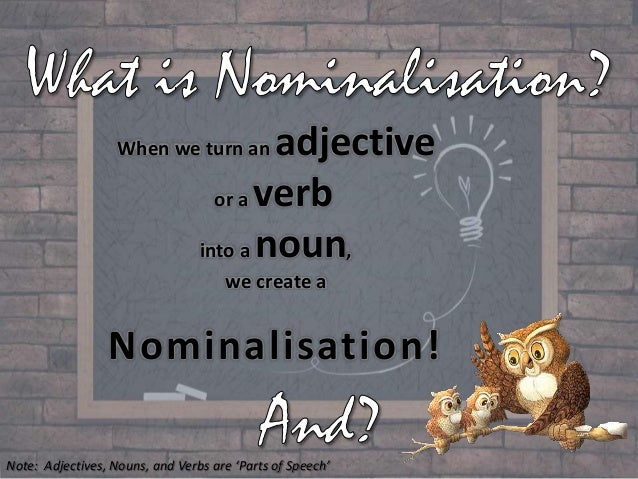Back to: ENGLISH LANGUAGE SS2
Welcome to class!
In today’s class, we will be talking about the nominalization of adjectives and verbs. Enjoy the class!
Nominalization of Adjectives and Verbs

You learned in the last class what nominalization is. Today, we’ll dwell more on converting words from other parts of speech into adjectives and verbs.
Let’s talk about the nominalization of adjectives first.
Remember adjectives are words we use to qualify or add more information to nouns. But it is also possible to convert words to adjectives from the noun with an attachment of the right suffix.
Can you think of the proper suffix to add (or what you can do) to the following words to convert them to adjectives?
Try it…
Courage Storm
Envy Tragedy
Girl Trouble
Gold Accident
Laugh Length
Let me show you how to discover the adjective form of the words, taking ‘courage’ as an example.
Try to use courage in a sentence. Of course, you won’t say that ‘the man is courage.’ You’d probably say ‘the man has courage’.
Now see if you can use an extension of that ‘courage’ in adjective form. Remember we have two types of adjectives. To use the adjective form of ‘courage’ in the attributive you would say ‘That is the ___________ man’. And to use it in the predicative form you would say ‘That man is ___________’.
Did you get the adjective form right?
The word is ‘courageous.’
But even if you didn’t get it right, you can still use the same explanation to determine the adjectival form of the other nouns listed above.
Let me tell you the next two, then you do the remaining by yourself or with the aid of your dictionary
Envy – envious
Girl – girlish
Now let’s do the same for verbs,
You can discover verbs from either adjectives or nouns with the addition of prefixes or suffixes.
The following words (noun and adjectives) will need a prefix each to change them to verbs.
Able Courage
Friend Joy
Rich Slave
But for the exception of one, you would probably get everything if you get the right prefix to add to the first word, ‘able’.
Did you get it? If you can’t yet, use the explanation I gave you above. We are trying to covert those words to a verb, isn’t it?
Okay!
Now think of a verb you know and use it in a sentence. You might want to write the sentence down. Then remove the verb and see if you can replace it with any of the words above. Of course, it won’t fit in since it is a noun. But is it possible to think of anything you could add to that word to make it fit in?
Okay. Let me tell you here. The suffix to add is ‘en-‘, with the exception of ‘friend’ which needs the prefix ‘be-‘ to change it to ‘befriend’. So you have:
enable encourage
befriend enjoy
enrich enslave
I hope you understood everything I taught you today.
Evaluation
Now using the same strategy above, add a suffix to change the following words to a verb:
public fast
sweet tight
smooth beauty
strong dark
fertile simple
broad wide
clean deaf
In our next class, we will be talking about Relative Pronouns and Vocabulary Development. We hope you enjoyed the class.
Should you have any further question, feel free to ask in the comment section below and trust us to respond as soon as possible.

IT WAS COOL,AT LEAST FOR ME TRYING THE FIRST TIME THANKS A LOT
THANKS A LOT it was fantastic
NOMINALIZATION OF ADJECTIVE AND VERBS MAKES SENSE AT LEAST FOR THE FIRST TIME FOR ME TRYING SO KEEP IT UP
hi
This makes sense a bit but I didn’t get what I wanted
Thanks for your feedback. What were you looking for specifically, so we can update accordingly?
I need their example
thanks 👍 for sharing
Where is thier noun forms
thanks
the question looks cool